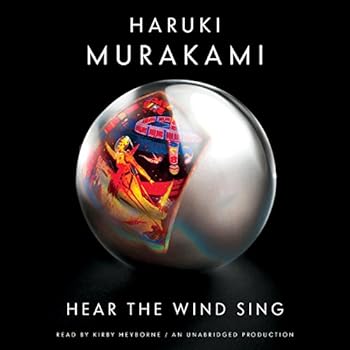
![]() Hear the Wind Sing by Haruki Murakami
Hear the Wind Sing by Haruki Murakami
First published in 1979, Hear the Wind Sing is Haruki Murakami’s debut novel (or novella, depending upon where one draws the line). An unnamed narrator tells the story of what happened to him over the course of eighteen days when he was a university student. He spends most of his time either drinking beer with his friend, “The Rat,” or else in a confused relationship with a woman.
To be honest, I did not enjoy Hear the Wind Sing, since I prefer to latch onto the plot when reading. The novel is divided into forty chapters, and though a larger narrative loosely ties everything together, Hear the Wind Sing might actually be better read as a series of related vignettes that produce an overall feeling of aimlessness and detachment.
And as I read further, I found myself approaching each chapter as an exercise or experiment in which Murakami, up late at night after closing his jazz bar, explored what he could do with a pen and paper. Given the novel’s opening line — “There’s no such thing as perfect writing, just as there’s no such thing as perfect despair” — perhaps navigating his way through the act of writing a novel was on Murakami’s mind as much as plotting.
 I did, however, enjoy those moments when I could see hints of what was to come later in Murakami’s career, and I suspect many of Murakami’s fans will feel the same. At one point, a character suggests that an intelligent mind is distinguished by its ability to simultaneously hold contradictory thoughts, which recalled Hard-Boiled Wonderland and the End of the World. Cats appear briefly, as do jazz records and Western music. The protagonist struggles to form relationships, which recalls many of Murakami’s later heroes.
I did, however, enjoy those moments when I could see hints of what was to come later in Murakami’s career, and I suspect many of Murakami’s fans will feel the same. At one point, a character suggests that an intelligent mind is distinguished by its ability to simultaneously hold contradictory thoughts, which recalled Hard-Boiled Wonderland and the End of the World. Cats appear briefly, as do jazz records and Western music. The protagonist struggles to form relationships, which recalls many of Murakami’s later heroes.
Hear the Wind Sing is the first of two novels tied together around “The Rat.” If I had not already read much of Murakami’s later work, I’m not sure I would read the second novel, Pinball, 1973. The narrator’s descriptions of the three women he’s slept with did not interest me, nor did the time he spent drinking beer with the Rat. In short, I’d recommend this short novel only to Murakami’s most devoted fans.
I listened to Penguin Random House Audio’s production of Hear the Wind Sing. Kirby Heyborne’s reading was smooth throughout and never once took me out of the story. Hear the Wind Sing was originally published in Japanese and Ted Goosen translated the story into English.



I didn’t love it either. I enjoyed meeting The Rat, of course, but I more interested in the story of how Murakami wrote it (that he wrote it in English first was fascinating to me). I think these books may have had more resonance in Japan since they seem to be describing seminal experiences.
Didn’t love either of them, but I’m glad I read them to see Murakami’s roots.
I really like this book, but I agree it doesn’t come close to his great later works. I’d give it three to three-and-a-half stars, but only if one reads it (and Pinball, 1973) AFTER the third and fourth “Rat” books:
1. Hear the Wind Sing
2. Pinball, 1973
3. A Wild Sheep Chase
4. Dance, Dance, Dance
I LOVE A Wild Sheep Chase and Dance, Dance, Dance, so for me it was a wonderful experience to go back and read these two early books in the (very loose) sequence of “Rat” books.
I’m extremely biased because Murakami is my favorite living novelist. I certainly wouldn’t START with these first two books as one’s first Murakami novels. They will feel like 1- to 2-star books without some sense of his other literature.
A good book to start with is After Dark, which I often teach because it’s a good a short work by him (and Murakami is usually best at long works of fiction). After that, I’d tackle one of his two greatest, longer works: Kafka on the Shore or Wind-Up Bird Chronicle. Many of my students who like After Dark and go on to read more of his novels feel that Kafka on the Shore is the work that truly hooks them after After Dark.
Thanks for the review, Ryan! I certainly agree that 2 stars is a accurate rating because I can see some people reading it and thinking it’s a 1 star or up to a 3 star. Few people would argue 3 1/2 or higher unless, like me, they are ALREADY Murakami nuts!
I love After Dark, but my favorite of his still, after all these years, is Wild Sheep Chase. Dance, Dance, Dance was also good but Wild Sheep Chase just brought together so many elements.
That said, I do think The Wind-Up Bird Chronicles is his masterpiece.